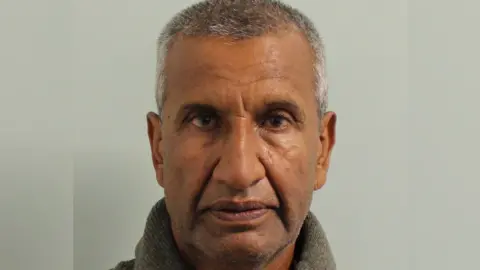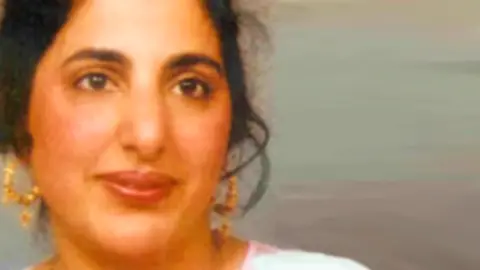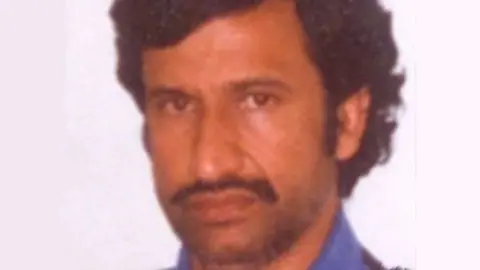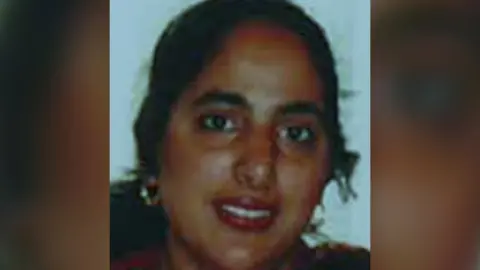Naziat Khan death: Zafar Iqbal jailed for murdering wife in front of children
 MET POLICE
MET POLICEA man who strangled his wife with her own scarf 21 years ago after being "embarrassed" at her attempts to secure a divorce has been jailed.
Zafar Iqbal, 62, murdered Naziat Khan in front of their three young daughters at her home in Norbury, south-west London, in August 2001.
Iqbal then abandoned the children to an acquaintance and fled to Pakistan.
At the Old Bailey, he was sentenced to a minimum of 19 years after he admitted murdering the 38-year-old.
The time he has already served in custody, five years and 15 days, will be cut from his jail term.
Repeated domestic violence
The court heard Ms Khan, who was born in England, married Iqbal in Pakistan in 1985 in an arranged marriage.
During the sentencing hearing, Anthony Orchard KC told the court of repeated incidents of domestic violence including one which left Ms Khan with two black eyes.
In January 2000, Iqbal wrapped a scarf around her head and mouth, tied up her legs, and threatened her saying: "I'm gonna kill you," the court heard.
He also took some of her jewellery and the attack was reported to police but later withdrawn.
The court heard in June of that year, Ms Khan started to initiate Islamic divorce proceedings after an incident saw her left with a fat lip.
The following January, the couple agreed to a reconciliation, but by June the relationship had broken down.
 Khan family
Khan familyMr Orchard KC said Islamic Council records showed on 20 August 2001, Iqbal called the office and asked for another four months to reply.
"He requested he be contacted by telephone, rather than letter in future, as someone else had read one of his letters and it was 'embarrassing to him'," he said.
"Shortly after 13:00 that same day, Naziat was killed," Mr Orchard added.
Iqbal carried out the killing "for no better reason" than he could not face the cultural shame that would follow from his wife's demand for a divorce, the Old Bailey heard.
He had also believed his wife was demanding a divorce while in a relationship with another man.
 Iqbal
IqbalOn the day of the murder, two of the daughters, who were then aged 10, arrived home and found their mother lying on the floor with a scarf tied around her neck, the Met Police said.
Their father and three-year-old sister were in the room.
Detectives said the daughters pleaded with Iqbal to let her go but instead he kept tightening the scarf and Ms Khan stopped moving.
Asked by one daughter why he was doing it, he replied: "Because she is having a divorce", the court heard.
He told the children: "If you talk or anything, I'll do it tighter, so the more you cry or talk the more it is gonna hurt her," the court was told.
Iqbal then took the scarf from one of his daughters and tightened it around her neck, and said he would do the same to both of them if they would not stop crying.
Police said he then made one of the children write a note pretending to be from their mother, which said she had gone to stay with relatives.
 MET POLICE
MET POLICEIqbal stuck the letter on the front door of the house before taking the children to an acquaintance in Croydon and fled the country.
In December 2017, the defendant was arrested and extradited to the UK four years later.
Judge Munro KC described his decision to flee as "cowardly" and said he had lived an "undeserved life as a free man for many years".
One of the couple's daughters, who cannot be named for legal reasons, vowed their mother would not become just an "honour killing" statistic.
She told Iqbal: "I pray you never forget her face and that when you sleep you think of not only her future you snatched, but ours too.
"She will never be forgotten and will remain in our hearts."
'Never lost hope'
The couple's two other children said they had waited 21 years for this day and through the "hardships and struggles" they "never lost hope".
Edward Brown KC, defending, had argued for a lighter sentence on the basis that cultural attitudes towards marriage and family would have influenced Iqbal's position.
But the judge told Iqbal he would finally face the punishment he "so richly deserved".
About the trauma inflicted on the children, he told Iqbal: "They lost their mother, their father and their childhood.
"You took their home, their friend, their teacher, their father and their mother."

Follow BBC London on Facebook, Twitter and Instagram. Send your story ideas to [email protected]
